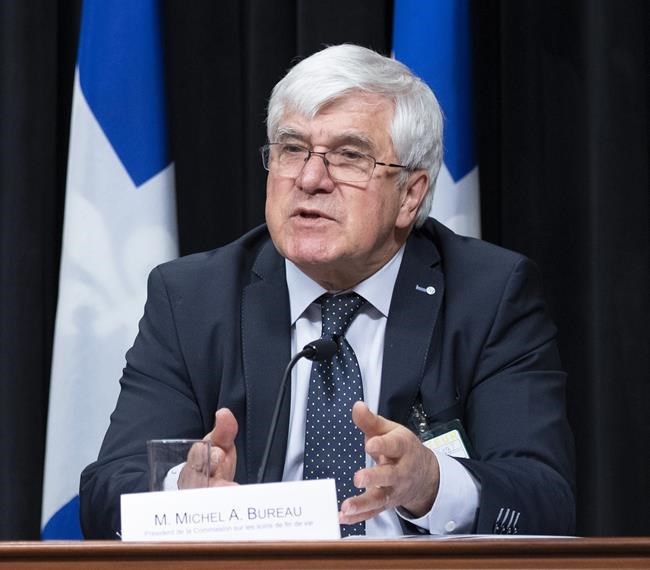MONTREAL — Quebec's college of physicians says some doctors in the province are afraid to perform medical aid in dying because of the threat of professional sanctions, as the number of patients seeking the procedure continues to climb.
Doctors are regularly contacting the professional order to express their concern about providing end-of-life treatments, Mauril Gaudreault, president of the Collège des médecins du Québec, said Friday in an interview.
"We're talking about doctors who are afraid of possible reprisals, for example, that one of their files might be investigated by the Collège des médecins of Quebec. I think doctors fear that," he said.
Gaudreault came out publicly on Friday to defend members after the head of Quebec's commission on end-of-life care — an independent body that monitors MAID and reports to the legislature — said earlier this month that a rising number of MAID cases were pushing the limits of the law.
Dr. Michel Bureau, head of the Commission sur les soins de fin de vie, issued a memo warning that Quebecers no longer saw MAID as a last resort and that he expected more than seven per cent of deaths in Quebec this year to be medically assisted — more than anywhere else in the world. Bureau went so far as to suggest that the way MAID is performed in the province could begin straying beyond the intentions of the law.
Gaudreault said Bureau's memo created a sense of insecurity and uncertainty among doctors and the general public, and that it may have pushed some physicians to stop offering MAID to patients.
In response to Bureau, Gaudreault published an open letter Friday saying that the college did not think that MAID was being offered too frequently, and that some doctors feared giving the procedure because of the risk of being investigated by the college.
"For the college of physicians, it is clear that MAID is not authorized too much," the president says in the letter. "And besides, too much in comparison to what? On what useful and scientific basis is (Bureau) relying here to suggest this?"
Gaudreault said in an interview that more than 99.5 per cent of MAID procedures administered over the past year were judged compliant by Bureau's commission. "So we're talking about a mere … 0.4 per cent that may have been deemed non-compliant."
"It seems inappropriate," he said, for Bureau to talk about doctors straying from the intentions of the law.
In the end-of-life commission's 2022 report, which covered a period between spring 2021 and spring 2022, it said 15 out of 3,663 doctor-assisted deaths in Quebec didn't respect the law.
Gaudreault said those 15 cases were reported to the college for review and none of them resulted in disciplinary notices to doctors. With the commission reviewing every case of MAID and referring problematic ones to the college, Quebec has the strictest guardrails for the practice in the world, he said.
In Gaudreault's letter, he said that given the province's aging population, the widespread knowledge about the practice, and the removal of the requirement that people be near the end of their life to receive MAID, it makes sense that more Quebecers are seeking to end their lives with the help of a physician.
There's also been a marked increase in the number of people opting out of aggressive treatments and who don't want to die of incurable diseases, he added.
Dr. Georges L’Espérance, president of the pro-MAID advocacy group Association québécoise pour le droit de mourir dans la dignité, said he believes the commission's memo intimidated doctors.
"A large number of doctors are very fearful of the response from the Commission des soins de fin de vie and, in particular, its president (Bureau), and therefore refuse to evaluate patients," L’Espérance said in an interview Friday. "There are doctors who started to provide medical aid in dying and stopped because (of) the feared reprisals" from the commission.
L’Espérance said that fear among doctors is limiting people's access to MAID.
The rising number of MAID cases in Quebec aren't a concern for L’Espérance, who said there is widespread acceptance of the practice in the province. If people want to die at the time of their choosing, among their loved ones, he said, "Why not? Why do we have to wait for the end of life with suffering, with sickness, with deterioration to obtain a certain liberation?"
While palliative care can address physical suffering, he said, it cannot address the psychological and existential suffering patients go through as they wait to die.
L’Espérance said he thinks there needs to be more doctors — including those who have administered MAID — on the province's end-of-life commission.
The commission declined on Friday to comment on the college's letter.
This report by The Canadian Press was first published Aug. 25, 2023.
Jacob Serebrin, The Canadian Press




